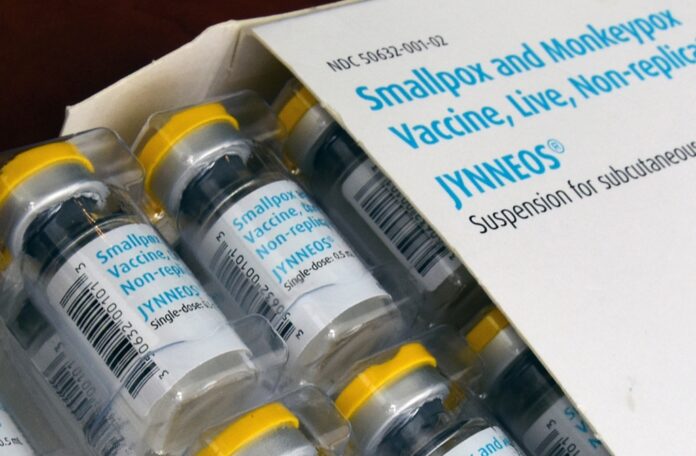
The spread of monkeypox in Marin has slowed and demand for the vaccine has eased even as the amount of vaccine arriving from the state has increased, the county’s public health officer said.
“We’re seeing fewer cases,” said Dr. Matt Willis. “The epidemic curve is certainly declining for monkeypox. It peaked a month ago in terms of the number of new cases per day.”
So far, 21 Marin residents have reported contracting the disease. By comparison, as of Tuesday, San Francisco had logged 748 cases; Santa Clara County, 146; Alameda County, 188; San Mateo County, 65; Sonoma County, 40; and Santa Cruz County, nine.
Earlier in the monkeypox outbreak, Marin health officials and LGBTQ leaders complained that the state had failed to supply the county with an adequate amount of vaccine. That situation has changed dramatically and not just in Marin.
“We have ample supply for the demand in Marin,” Willis said. “Clinics across the Bay Area are seeing empty slots. They used to be full with lines, and we didn’t have enough doses for the people who were coming. Now there are doses left over after each clinic.”
Nonetheless, Gov. Gavin Newsom approved an emergency budget package Tuesday that will provide $41 million to fight the spread of monkeypox.
In Marin’s case, there are two likely reasons the supply of vaccine is exceeding demand. First, more vaccine has arrived from the state. Willis said that because Marin used 89% of its first allotment of vaccine, it was one of only eight counties to receive a second allocation.
Some 623 Marin residents have received their first jab of the vaccine, which requires a two-dose regimen. Willis said the county has about 1,000 doses of vaccine, enough to administer second shots and more.
Willis said that while Marin’s vaccine supply has grown, demand has not. He said that might be because most of the Marin residents at highest risk of contracting monkeypox have already been vaccinated.
“What we’re seeing statewide now,” Willis said, “is that there has been relatively high access and saturation of the groups we’ve been most concerned about. Not everyone needs this vaccine. I don’t see us getting to a point where we’re treating the monkeypox vaccine like we are the vaccine for COVID-19.”
The initial criteria for vaccine eligibility reflected the fact that some groups face a much higher risk of contracting the virus. Eligibility was reserved for gay or bisexual men or transgender people who had multiple sexual partners in the prior 14 days; sex workers; or anyone with known exposure to someone with monkeypox.
“It is really great that at this point Marin County is getting a fair and appropriate allocation of the monkeypox vaccine,” said Adrian Shanker, the executive director of Marin’s Spahr Center, an LGBTQ advocacy group. “We weren’t getting that early on, but we are now.”
Willis said all 21 people in Marin who contracted monkeypox have been men who fall into one of the high-risk groups.
It’s possible that there are Marin residents in this high-risk group who remain uninformed about the monkeypox vaccine or who have chosen not to be vaccinated, like that small segment of the population who have resisted getting the COVID-19 vaccine.
Willis said the Marin public health office has started testing the county’s wastewater for evidence of monkeypox. It has detected a sign of the virus in Novato, which doesn’t correspond with reported cases.
“That raises the concern there may be cases we’re not ascertaining,” Willis said.
Shanker said the highest-risk members of Marin’s LGBTQ community have “shown a profound interest in receiving the vaccine.”
“We have a lot of evidence that shows that the LGBTQ community is really not vaccine hesitant in general,” Shanker said.
Willis said to ensure that high-risk people aren’t being missed, the county is broadening its vaccine eligibility criteria. It is dropping any stipulation regarding the number of sex partners people have had over the last week or two.
The Marin public health office is also complying with a recommendation from the state Department of Public Health that it refrain from referring to the disease as monkeypox and instead use MPX or mpox.
In June, the World Health Organization announced it was renaming the monkeypox virus. Tedros Adhanom Ghebreyesus, the director-general, said, “In the context of the current global outbreak, continued reference to, and nomenclature of this virus being African is not only inaccurate but is also discriminatory and stigmatizing.”
According to the Centers for Disease Control and Prevention, monkeypox was discovered in 1958 when two outbreaks of a pox-like disease occurred in colonies of monkeys kept for research, but the source of the disease remains unknown.
“Prior to the 2022 outbreak, monkeypox had been reported in people in several central and western African countries,” the CDC’s website states.
Shanker said, “We’re using both the word monkeypox and the word mpox as we communicate to our community because we feel the most important thing is that our community knows how to access the vaccine. We don’t want to miss people because they didn’t see that the name has changed.”
Willis said he shares Shanker’s concern about creating unnecessary confusion.
“I think we’re going to have to go through a period of using both names,” he said, “just so that people recognize that they’re one and the same.”








